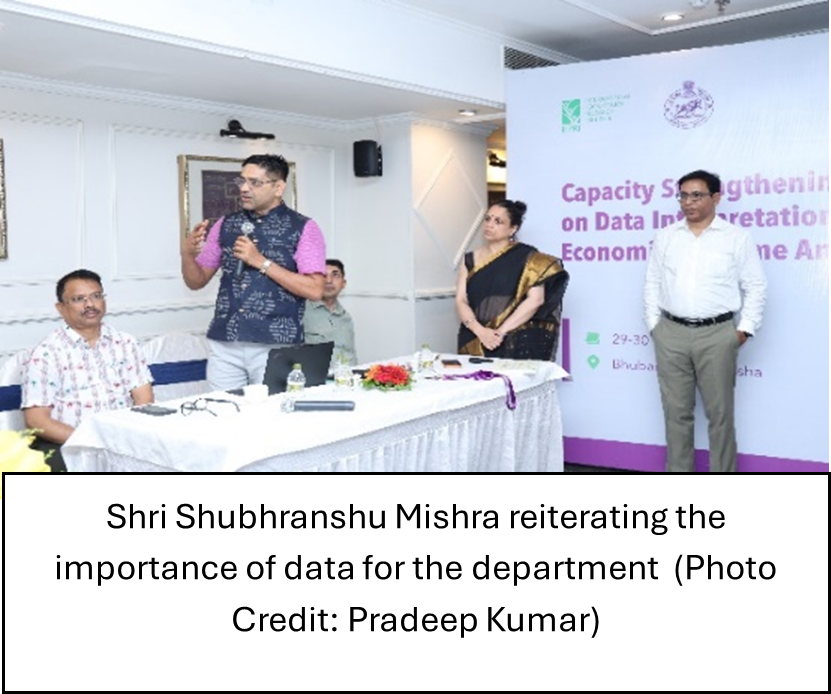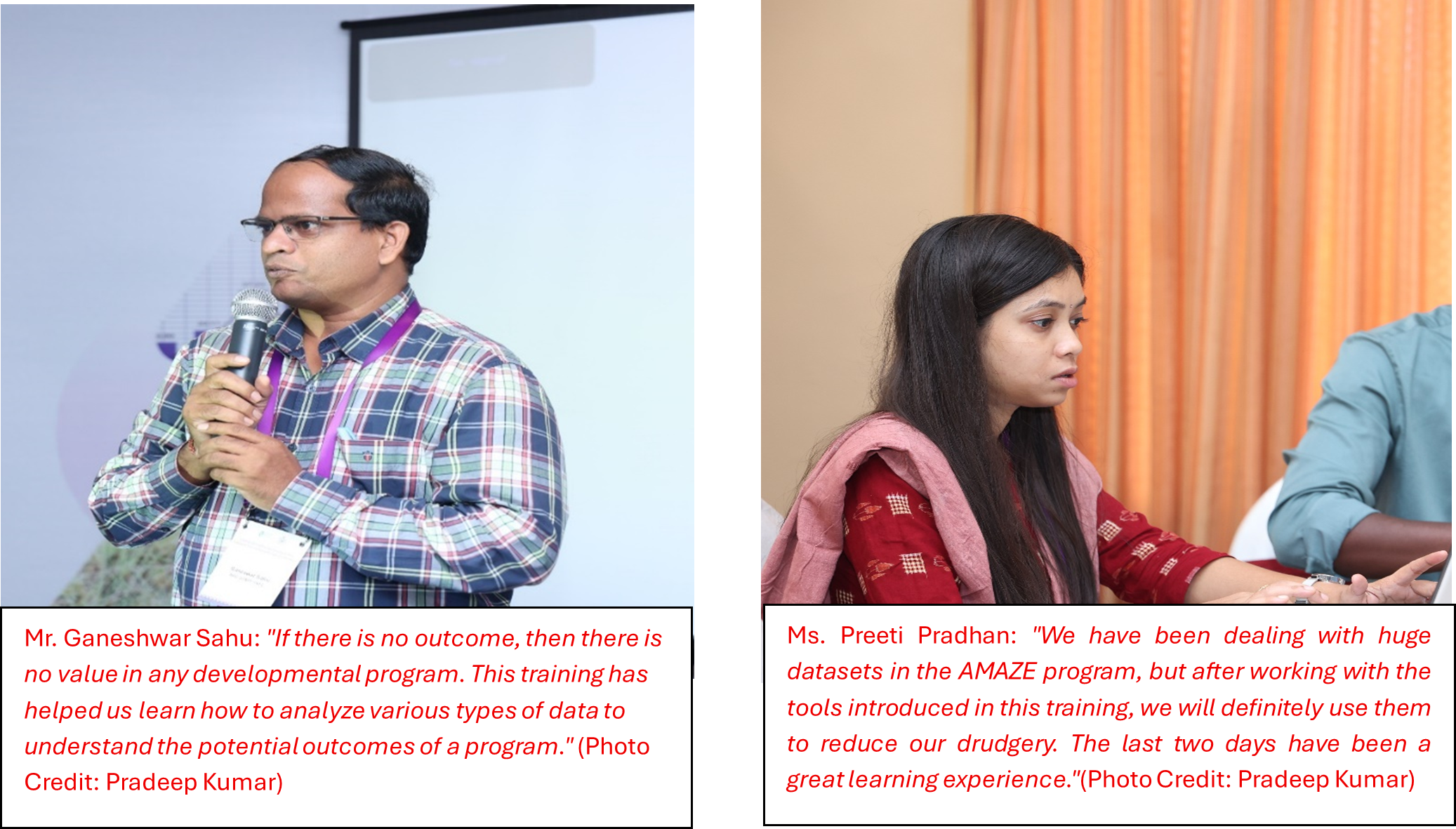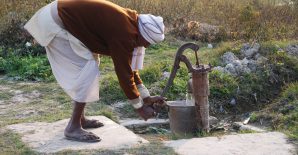Deepening Data-Driven Governance in Odisha Agriculture
As Odisha transforms its agricultural landscape, evidence-based policymaking has become increasingly important. Agri-food systems significantly affect climate, biodiversity, diets, livelihoods, and inclusiveness of women and marginalized groups, highlighting the need for food system transformation. Despite digitization and decision-support systems, no state-level metrics are currently tracking the inclusivity of these changes. Developing robust indicators to assess smallholder resilience, gender equity, and the welfare of remote tribal populations is critical. Recognizing this, the Department of Agriculture & Farmers’ Empowerment (DAFE), Government of Odisha, in collaboration with IFPRI, organized the second phase of the training on Data Interpretation and Economic Outcome Analysis from May 29-30, 2025, in Bhubaneswar.
Supported by the Gates Foundation under the FASTR project, this two-day residential training strengthened field officers’ capacities for evidence-based policymaking, program monitoring, and course corrections. By equipping participants with data analytics tools, the training addressed critical gaps in implementation, ensuring agricultural programs are effectively tracked, assessed, and aligned with Odisha’s transformation goals.
From Phase-I to Phase-II: Transitioning from Knowledge to Application
In the previous blog, we shared how Phase-I training in April 2025 familiarized frontline officers with foundational concepts of agricultural transformation and analytical tools. Phase-II built on this foundation, focusing on practical application and data interpretation. Participants were trained to design and monitor large-scale digital surveys using Kobo Toolbox, managing data collection efficiently. Using real datasets, such as PMFBY crop insurance enrolment data, officers learned to analyze, visualize, and interpret outputs. The training aimed to equip them to make evidence-based recommendations, identify course corrections, and support the department in using both qualitative and quantitative data for informed policymaking.
A Diverse, Dynamic Learning Cohort
To build a robust system, 43 frontline officers responsible for field monitoring and project data from all three directorates and 30 districts attended the training, alongside partner agencies like ISB, Access Development Services, Dvara E-Registry, Samagra, PRADAN, Palladium, CSM Technologies, Niruthi, and WASSAN. The cohort was multi-disciplinary and inclusive, with 41.5% women, comprising Assistant Agriculture and Horticulture Officers, Project Coordinators, Agronomists, Analysts, Engineers, and MIS Experts. Age distribution favored youth, with 49% in their 30s and 40% in their 20s, reflecting a focus on long-term analytical capacity in Odisha.

Structured Learning with Hands-On Relevance
The training was designed with a balance of concept-building, tool-based demonstration, and peer-led exercises. Delivered by experts from IFPRI – Dr. Devesh Roy, Dr. Mamata Pradhan, Mr. Sunil Saroj, Mr. Abul Kamar and Ms. Vandana Vidhani – the sessions were interactive, exercise-oriented, and designed to enable immediate application.
The training equipped participants with practical skills in survey design, digital data collection using Kobo Toolbox and ODK, and data management and analysis in Stata and Excel. Officers learned to clean, analyze, and visualize field datasets—such as crop insurance records from Boudh district—identifying trends, patterns, and relationships. Modules on research writing and mixed-methods analysis helped integrate qualitative and quantitative insights for evidence-based decision-making. Through live demonstrations, group exercises, and case discussions, participants gained hands-on experience enabling them to monitor programs effectively, interpret data accurately, and support the department in evidence-based policy formulation.
Setting the Tone for Transformation
The training was inaugurated by Shri Shubhranshu Mishra (OAS), Additional Secretary, DAFE, who highlighted the Department’s goal of fostering a “data-first culture,” calling data “the new gold” and emphasizing analytical tools as instruments of systemic reform. In his valedictory remarks, he encouraged young officers to lead with insight and evidence. Dr. Sangram Keshari Pattanaik and Shri Nagendra Kumar Malik also underscored the importance of using data for planning, monitoring, and course corrections.

Measurable Outcomes and Participant Feedback
Feedback survey of the 41 participants revealed encouraging responses:
- 90.2% rated the qualitative data session greater than and equal to 4 out of 5
- 85.4% expressed willingness to adopt digital tools like Kobo Toolbox for field operations
- 78%+ believed the training would significantly improve their job performance

Conclusion: A Foundation for Inclusive and Resilient Agriculture
The Phase-II training fostered a shift in mindset, enabling officers to analyze data, derive insights, and inform high-level decisions. Cross-functional peer learning and practice-based exercises with real datasets strengthened professional networks and analytical skills. Participants left confident in converting field experiences into structured evidence, supporting evidence-based policymaking. By investing in the analytical capacity of frontline officers, Odisha is reinforcing inclusive agricultural governance, ensuring programs are not only well-designed but effectively monitored, evaluated, and aligned with the state’s broader food system transformation goals.

This blog was written by Amit Kumar Burman and Vandana Vidhani with contributions from Shri Subhranshu Mishra (DAFE), Dr. Sangram Keshari Pattanaik (DAFE), and the IFPRI Training Coordination Team.



